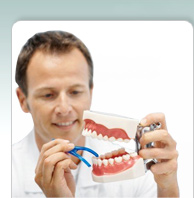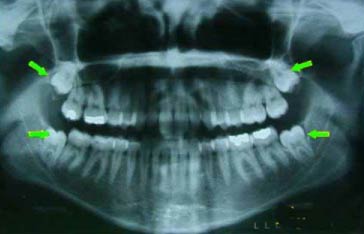 |
 |
|
|
| |
 Wisdom teeth are known as third molars in dentistry. They are the last teeth to erupt in the mouth.
When they align properly, and gum tissue is healthy, they do not have to be removed. Unfortunately, this does not generally happen. The extraction of wisdom teeth is necessary when they are prevented from properly erupting within the mouth. They may grow sideways, partially emerge from the gum, even remain trapped beneath the gum and bone. These poorly positioned impacted teeth can cause many problems. When they are partially erupted, cleaning around the tooth becomes difficult causing food lodgment and bacteria to grow. This will eventually cause an infection. The result is swelling, stiffness, pain and illness. The pressure from the erupting wisdom tooth may move other teeth and disrupt the orthodontic or natural alignment of teeth. A tumor or cyst may also form around the wisdom tooth resulting in destruction of jaw bone and surrounding teeth. Early removal is recommended to avoid such future problems.
|
| |
Risks of Wisdom Tooth Surgery |
| |
In considering wisdom tooth extractions and the risks of doing surgery, you should appreciate that though this risk is relatively small, it is not absolutely zero. There are 'standard risks' associated with any type of surgery that include the normal pain, swelling, bruising, bleeding, and infection. There are also other specific risks associated with wisdom tooth surgery and these include being left with a numb lip, chin, or tongue (permanently or temporarily), or a problem with the sinus in the upper jaw. These risks, however, are very uncommon and some even quite rare. Your oral and maxillofacial surgeon will discuss all the risks with you on an individual basis. |
| |
| Post extraction instructions |
| |
Bite on gauze for 30 minutes to stop any bleeding. If bleeding continues, place another gauze and continue to apply pressure. |
| |
| Apply ice pack from external surface for few minutes. |
| |
| For at least 24 hours DO NOT : |
| |
| > Smoke |
| > Drink through a straw |
| > Drink alcohol, Carbonated Beverages, or Hot liquids |
| > Blow your nose |
| > Spit excessively |
| |
Any of these things may cause the blood clot over the surgery to dislodge from the "socket", causing a "dry socket" and resulting in unnecessary pain. |
| |
Do maintain a soft diet for the remainder of the day, things like warm soup, ice cream, milk shakes (remember no straws), etc. |
| |
| If your discomfort or bleeding continues or worsens call the office for re-examinations |
| |
| If you were given medications, take them according to the instructions. |
| |
| |
| If you have pain medications at home, you may take them according to instructions. |
| |
| Next morning, start rinsing gently with warm saltwater every 4 hours for at least 1 day. |
| |
Moderate discomfort and swelling occur with most oral surgery procedures. They usually begin within the first 12 hours following the surgery and start to decrease after 48 hours. The amount of discomfort and swelling is unpredictable. |
| |
| If any problems or questions do arise, please feel free to call the office. |
| |
| |
| Back |
|
|
|
| Site Map |
|
Site Designed & Maintained by Epigram Digital |
|



